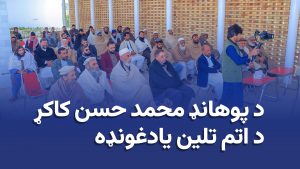By
Hassan Kakar
(1)
It is an irony of history that a people whose resistance to the Soviet invasion became an immediate catalyst to the dissolution of its empire and the end of the cold war soon ceased to make headlines, despite the civil war which is raging in their land. Edward Shevardnaze, in his recent book, The Future Belongs to Freedom, states thus of a consequence of this resistance. “Perhaps it was the experience of the Afghan epic that prompted us to think of the possibility of partnership and cooperation with the West”.
But for Afghans themselves the consequences of their resistance are not only the absence still of a national government but also of a civil war and the interference in their affairs by their other neighbors. The dissolution of the Soviet Union, and the apparent apathy toward the Afghan problem of the United States Administration since the withdrawal of Soviet troops have encouraged these regional powers to pursue their conflicting agendas in Afghanistan.
That is why former United Nations General Secretary, Parez de Cueller’s five-point plan of settlement of May 1991 that calls for an intra-Afghan dialogue to set up a transitional government that would ultimately lead to the institution of a national government through general elections has so far made no progress, whereas a similar plan for Campuchia with similar problems has already succeeded. This in spite of the fact that all the governments interested in Afghan problem have declared their support for the plan. This also in spite of the fact that with exception of Islamic hard-liners who stand for war and an ideological state all those Afghans who are concerned first and foremost with the independence and integrity of the country have in principle demonstrated their support for the plan. These Afghans among whom are included leaders of the moderate Islamic organizations, the former monarch, and the Kabul government, are in the clear majority. Yet the United Nations special envoy, Benan Sevan, who is charged with the implementation of the plan has apparently not been able to make any substantial headway during the past seven months of his mission in which he has held talks with all the parties involved in the Afghan issue.
The main reason for this stalemate is the attempt to bring every party involved in the conflict to the table of negotiation. But for two reasons this attempt is unlikely to succeed: the intransigence of the Islamic hard-liners and the agendas of some neighbors on Afghanistan. Having fought in the forefront of the resistance the Islamic hard-liners feel entitled to have the monopoly of state power. The disappearance of the Soviet factor and the beleaguered government of President Najibullah in Kabul have further strengthened them in their belief. In itself this would not have been a serious obstacle to negotiations had the Islamic har-liners not been encouraged in their stand by their foreign patrons.
As the resistance organizations were encouraged by certain military circles in Pakistan in their unsuccessful bid to liberate the provincial city of Jalalabad following the withdrawal of Soviet troops they were also last September encouraged to capture the provincial city of Gardez. For this purpose in addition to supplying them with various kinds of weapons they were even given the 300 Iraqi tanks which had been captured in the Gulf war. But after a month the attack was decisively repulsed with heavy casualties to the attackers.
The Islamic organizations are also encouraged to set up a transitional government to the exclusion of other parties involved in the issue. For this purpose the trilateral talks held in Tehran last August among members of only a few Islamic organizations and the representatives of the government of Iran and Pakistan were followed in December by the setting up to yet another interim government to be led exclusively by heads of all the Islamic organizations quartered in Pakistan. This in spite of the fact that the first interim government which was set up following the Soviet withdrawal failed to be effective. In fact the new attempt is made in an effort to neutralize the attempts of the United Nations General-Secretary’s settlement of the problem through their traditional mechanism.
No wonder then that the General-Secretary in his report to the General Assembly has complained that “interference in the internal affairs of the Afghan people continues to be exerted by some elements who still pursue a military option despite the support given by the United States, the Soviet Union, Iran, Pakistan and Saudi Arabia to his plan.” These “elements” are the Islamic extremists who are encouraged in their stand by their foreign patrons, particularly Pakistan’s Inter-Service Intelligence (ISI). Sibgatullah Mojaddidi, head of the first Afghan interim government is even more blunt in stating recently that “his efforts for finding a political settlement are being sabotaged by Pakistan military intelligence services”.
Why the latter pursue this course in apparent opposition to the official policy of the government whose prime minister Nawaz Sharief, like his predecessor, Benzir Bhutto, has concluded that “Pakistan should push harder for an [afghan] political settlement through support for the U. N. 5-point peace statement” is because ISI’s entrenched Islamist elements dream of a client government in Afghanistan to enable it to influence the newly independent Central Asian Muslim Republics, as well as to counterbalance the unfriendly India with whom Pakistan has serious problems over Kashmir.
This Pakistan-dominated agenda of a neo-Pan-Islamism is the main stumbling block standing in the way of an Afghan settlement. But the difficulties in the way of the implementation of such an agenda are so enormous that they make tis realization dangerous. The grand failure of a similar Soviet agenda should serve as a convincing warning. This is besides the view that the agenda may not serve the real long-range interest of any country in the region including Pakistan, whose internal stability is far from being in a satisfactory state.


